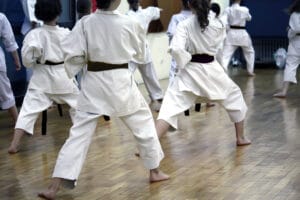 It’s recommended that children over the age of two engage in at least an hour of moderate physical activity per day — and adults should follow their lead. Martial arts classes can be an excellent way to stay active, become part of a community, and develop valuable skills. But in order to get the most out of your Brazilian Jiu Jitsu class, you’ll need to learn some valuable safety tips. If your Brazilian Jiu Jitsu basics don’t cover injury prevention, you’ll be missing out on essential information and you’ll increase your risk of getting hurt on the mat. Here are a few ways you can prevent injuries during your BJJ classes.
It’s recommended that children over the age of two engage in at least an hour of moderate physical activity per day — and adults should follow their lead. Martial arts classes can be an excellent way to stay active, become part of a community, and develop valuable skills. But in order to get the most out of your Brazilian Jiu Jitsu class, you’ll need to learn some valuable safety tips. If your Brazilian Jiu Jitsu basics don’t cover injury prevention, you’ll be missing out on essential information and you’ll increase your risk of getting hurt on the mat. Here are a few ways you can prevent injuries during your BJJ classes.
Always Warm Up
Stretching is an essential part of Jiu Jitsu for beginners and advanced students alike. You need to prepare your body for what you’ll be asking it to do in class. Going right into a class with cold, tense muscles will make injury far more likely. Before every class, make sure to warm up. In the short term, this will prime your muscles for what’s to come. And in the long term, you’ll increase your flexibility to promote overall health and wellness. Regular stretching can improve your game on the mat and ensure your muscles and ligaments are less likely to become strained. Make it part of your pre- and post-class routine from the start.
Know Your Limits
One of the most important Brazilian Jiu Jitsu basics is to leave your ego at the door. While you should get to a point where you feel confident in your abilities, you should never come into a class with a sense of arrogance. Being overly cocky can cause you to push well past your limits and increase your chances of getting hurt. Always choose your opponents wisely and know when it’s better to admit defeat. Instead of stubbornly forcing your way through a submission and risk straining your body, become familiar with your unique limits and learn from the situation for next time.
Focus On Technique
Your technique will be one of the most important Brazilian Jiu Jitsu basics you have — and mere force cannot make up for it. You should always move in a controlled manner and actively recall the techniques you have learned when faced with a tough situation. All martial arts are highly technical and require focus and control. If you try to rely on force or instinct alone, you will likely end up getting hurt. If all else fails, go back to what you’ve been taught.
Prioritize Strength Training
Strength training isn’t required for BJJ, but it can be a good way to achieve your fitness goals and prevent injuries in class. Developing your muscular strength can make overexertion less likely and allow you to withstand any mishaps that do happen on the mat. Improving your strength will allow your joints to move in the correct way, as well, making injuries less likely to occur. Ask your instructor about what they would recommend as a supplemental strength training program for you.
Eat and Hydrate Properly
In many cases, your personal habits outside of class will matter just as much when trying to prevent injuries. Increasing your water intake will lessen the chances you’ll feel run down on the mat. Since you’re more likely to become injured when you’re tired and dehydrated, it’s a good idea to drink as much water as possible before, during, and after class. What you eat can make a big difference, too. While there’s not a specific diet all participants of BJJ should follow, it’s essential that you incorporate enough fats, carbs, and other healthy ingredients to power through your classes and recover afterward. You’ll need adequate energy and nutrition to fuel your body during training if you want to prevent fatigue and subsequent injuries.
These Brazilian Jiu Jitsu basics can allow you to prevent injuries even before you walk into the studio. For more information on our classes and the training you’ll receive, please contact us today.



